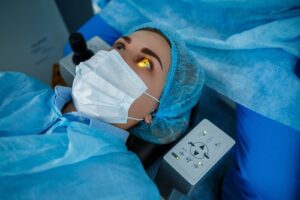
Choosing LASIK is one of the most exciting decisions you can make about your vision. It’s always a good idea to know what to expect when you are scheduled for any kind of procedure.
LASIK is easy to understand, and when you do, you’ll be able to focus your attention on all the experiences you’ll enjoy with your LASIK-improved vision. Keep reading to find out what to expect during your LASIK procedure in Evansville!
What is LASIK?

LASIK is the most popular form of vision correction surgery. It can correct nearsightedness, farsightedness, and astigmatism.
The goal of LASIK is to reduce or eliminate your need for glasses or contacts. It accomplishes this by reshaping the cornea to correct your refractive error.
The cornea is the transparent surface that covers the iris. In a person with a refractive error, their eye is either too short or too long, or they have an irregularly shaped cornea.
When you have a refractive error, the shape of your eye can prevent light from focusing properly onto the retina. The retina is a layer of tissue at the back of your eye that sends visual information to the brain for processing.
LASIK modifies the shape of the cornea so that it can compensate for those irregularities and bend light precisely to create clear images.
What Happens During LASIK?

Before the start of the procedure, your LASIK surgeon will numb the surface of your eye with anesthetic eye drops. This helps to ensure you are comfortable during the procedure.
Throughout the procedure, you will be asked to stare at a light. Once preparations are complete, reshaping the cornea involves a few steps.
First, your LASIK surgeon will create a small incision on the surface of your cornea. This will create a flap, which will then be folded back so they can access the inner layers of your cornea.
In the past, a bladed instrument was used to create the flap. Today, at Hayden Vision, an advanced laser called the IntraLase femtosecond laser is used.
This laser applies infrared technology to delicately break apart the tiny collagen connections of the cornea. The next step is to begin reshaping the cornea.
Your LASIK surgeon at Hayden Vision in Evansville, Indiana, will use the ALLEGRETTO WAVE Eye-Q, because of its unmatched speed and precision. This wavefront-guided treatment evens out the surface of the cornea, ensuring there are no irregularities.
After the cornea is altered to correct for your precise refractive error, the flap is repositioned. Over time, the flap will naturally heal on its own without the need for stitches.
LASIK is a relatively quick procedure, taking only about thirty minutes.
Do I Get to Go Home After LASIK?

LASIK is an outpatient procedure. This means that you do not need to go to the hospital to have it done.
It also means that you can return home after your procedure. You can have LASIK in the morning and be free for the rest of the day.
Your eye doctor may ask that you remain in the office for a half hour or shorter for observation. They will also review post-operative care with you, including any necessary medications or eye drops to facilitate the healing process.
You will be able to see immediately following your procedure, but your vision is usually blurry at first. You will need to have someone drive you home and to your initial follow-up visit until you are cleared to drive yourself.
When Will My Vision Improve After LASIK?
How long it takes for LASIK patients to witness the full potential of their vision varies from person to person. Some people notice immediate improvement as soon as the procedure is over.
Others may have to wait a few days to weeks for their eyes to adjust and heal. It can take months for your vision to fully stabilize, although your vision will gradually improve during this period.
It’s completely normal to have blurry vision after getting LASIK. This usually improves within a short period of time, along with other side effects, such as an itchy or gritty sensation.
LASIK has a very high patient satisfaction rate. Over ninety-three percent of patients say they see as well or better than they did with glasses or contacts.
However, total visual freedom is not guaranteed. Your results depend on a range of individual factors.
Talk to your eye doctor about what results you can expect from your procedure.
Who Is a Good Candidate for LASIK?

LASIK is only FDA-approved for those who are eighteen and older. It’s best for you to have stable vision, meaning your prescription has not changed within at least the last year.
Good LASIK candidates will also have healthy eyes. Conditions including glaucoma, cataracts, and severe dry eye can affect the outcome of the procedure.
Good candidates also have good overall health, as certain health conditions can complicate healing and increase a patient’s risks.
You also must have a glasses prescription that is within the limits that LASIK can correct. One of the most important qualifications for LASIK is sufficient corneal thickness.
When your corneas are too thin, it can make the creation of the flap in the beginning of the procedure unsafe. Hormones can also affect the stability of your vision, so LASIK is not recommended for those who are pregnant or nursing.
Are you interested in learning more about LASIK or determining if you may be a good candidate for the procedure? Schedule your LASIK consultation at Hayden Vision in Evansville, IN, today!
